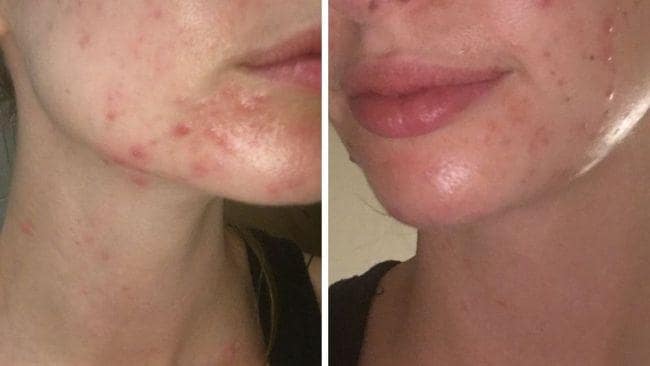
Edwina Carr Barraclough from whimn.com.au is sick of being told to “just deal” with adult acne.
Hey, I’m Edwina and I have adult acne that I’m treating with serious medication.
The second I typed that sentence I felt myself shrinking in shame as I imagined all of the things you might now be thinking about me. For starters, suck it up, princess! Or maybe you eye rolled and thought, acne isn’t a real skin disease – this chick just click-baited me (it is, for the record). Or maybe you see me as outrageously vain, because my skin isn’t that bad and there are far, far more serious issues to worry about.
They’re all thoughts I’ve had about myself over the four or so years I’ve suffered painful, cystic, hormonal adult acne on and off and they’ve held me back from taking real action to combat the constellation of pimples streaked across my lower face at any given time.

I’ve lived with the kind of pimples on my jawline that hurt when I yawn and leave a fresh, pink scar as a parting gift – even though I’ve resisted the temptation to squeeze them. I’ve rocked up to job interviews, professional engagements and have filmed work videos as a 32-year-old woman with bumpy, forever greasy skin that mirrors that of a pubescent teenager. I’ve tried lotion after lotion, product after product and some medications, too, to no avail.
To some, acne is just a fact of life, something we should just deal with. Because my acne is by no means at the highly severe end of the spectrum, I’ve internalised the school of thought that to treat it would prove me to be exceptionally shallow. But as anyone who’s suffered acne as an adult can attest, it can be truly debilitating on a deeper level.
On one side, there’s the embarrassment it brings. I’ve often tasked my partner with requesting our morning coffees, or ordering in a restaurant, because I’ve been too ashamed of my skin to look anyone in the eye. But a step on from the put-a-bag-over-my-head kind of humiliation I’ve experienced is a very clear link between the state of our skin and our mental health.
In 2018, a study published in The British Journal of Dermatology discovered that in the year following an initial acne diagnosis, those affected were at a 63% higher risk of major depression than those without acne. This year, a study conducted by Northwestern University found that of a sample of hospitalisations, patients who had acne were more than twice as likely to report mental health conditions than those who didn’t have acne.
On one side, there’s the embarrassment it brings. I’ve often tasked my partner with requesting our morning coffees, or ordering in a restaurant, because I’ve been too ashamed of my skin to look anyone in the eye. But a step on from the put-a-bag-over-my-head kind of humiliation I’ve experienced is a very clear link between the state of our skin and our mental health.
In 2018, a study published in The British Journal of Dermatology discovered that in the year following an initial acne diagnosis, those affected were at a 63% higher risk of major depression than those without acne. This year, a study conducted by Northwestern University found that of a sample of hospitalisations, patients who had acne were more than twice as likely to report mental health conditions than those who didn’t have acne.
When you combine the self-esteem and mental health effects with the fact that adult acne seems to be on the rise, particularly for women (an American Academy of Dermatology study found women are more likely to develop adult acne, with some estimates finding as high as one in three women could experience it), it’s clear this is not a health issue we can continue to dismiss as vanity. Dr Natasha Cook, dermatologist and founder of Sydney’s Darlinghurst Dermatology, agrees that we need to start treating adult acne as though it’s a “legitimate disease”.
“One of the most rewarding parts of my job to treat is acne as you are fixing more than just the skin – you are empowering people and reinvigorating their sense of self and their self-esteem,” Dr Cook tells whimn.com.au.
“Unlike other illnesses that you may not be able to see, this one is on display to the world, affecting how people feel about themselves. That minimising old school attitude of ‘toughening up’ is frustrating and totally unhelpful.”
Women who are focused on their appearance are wrongly branded vain, shallow and conceited and it’s this reductive, insidious view that I’m learning to gradually overcome. Had I been able to view my own personal struggle with adult acne as a skin disease I was well within my rights to seek medical attention for, rather than just an embarrassing fact of life, I would’ve got the medical treatment I deserved years ago.
Now, a couple of months into the acne medication known as roaccutane (or isotretinoin), I’m already seeing positive results that have made a world of difference to how I feel as I go about my day. The benefits of doing something about acne? They go much further than skin deep.
If you or someone you know needs help, phone Lifeline on 13 11 14 or the 24-hour Suicide Call Back Service 1300 659 467.
[costhetics-gallery template='teaser' slug='the-skin-disease-no-woman-should-have-to-feel-shallow-about-treating' /] [costhetics-concern-related-treatments slug='the-skin-disease-no-woman-should-have-to-feel-shallow-about-treating' /]